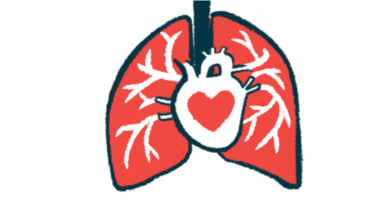TNF-alpha inhibitors found safe, effective for cardiac sarcoidosis
Treatment seen to ease inflammation, need for steroids in patients

Treatment with tumor necrosis factor-alpha (TNF-a) inhibitors — which block a type of immune protein in the body — was found to ease signs of inflammation and reduce the need for corticosteroids in people with cardiac sarcoidosis in a new analysis.
Safety data, meanwhile, indicated that such treatments were linked to relatively low rates of serious side effects, including infections, cancer, and cardiovascular hospitalizations.
Specifically, the analysis found that both the TNF-a inhibitors tested — adalimumab, sold as Humira or biosimilars, and infliximab, available as Remicade or biosimilars — “can be effective in all categories of patients” with the rare disorder.
“These data offer further evidence supporting consideration of [TNF-a] inhibitors for treatment of steroid-refractory [cardiac sarcoidosis],” the researchers wrote, noting that the need for additional studies remains.
The study, “Clinical Response to Tumor Necrosis Factor-α Inhibitor Therapy in the Management of Cardiac Sarcoidosis,” was published in The American Journal of Cardiology.
Corticosteroids are first-line treatment in cardiac sarcoidosis, despite side effects
Sarcoidosis is characterized by the formation of small clumps of inflammatory cells, called granulomas, in the body’s tissues.
In up to 30% of patients, granulomas are found in the heart, a condition known as cardiac sarcoidosis, which can be accompanied by irregular heartbeat and cardiac dysfunction.
First-line treatments include immunosuppression with corticosteroids, but these medications are associated with side effects in the long-term. Thus, therapeutic alternatives are needed.
TNF-a inhibitors such as adalimumab and infliximab are sometimes used off-label to treat sarcoidosis patients. They work to block TNF-a, an inflammatory signaling molecule implicated in granuloma formation.
Still, their use in cardiac sarcoidosis specifically is not well established. While reports indicate that these treatments can resolve signs of cardiac sarcoidosis and reduce corticosteroid doses for patients, there is a hesitancy to use them in the clinic, according to researchers.
That’s because of a potential link between these medications and worsening heart failure — a warning that comes on the therapies’ prescribing labels. The medications also are associated with other potentially serious side effects, like infections or cancer.
In their study, the scientists retrospectively reviewed data from cardiac sarcoidosis patients who were treated with adalimumab or infliximab between 2016 and 2021. All were included in a Mayo Clinic research database.
The analysis involved 31 patients, predominantly white individuals with a median age of 53, who had probable, presumed, or definite cardiac sarcoidosis. Of them, 15 were treated with adalimumab, 13 with infliximab, and three started on adalimumab and later transitioned to infliximab due to side effects.
The patients had been living with cardiac sarcoidosis for a median of about 1.5 years before starting a TNF-a inhibitor, which they used for a median of 14 months, or a little more than a year.
A form of PET imaging using a tracer called 18F‐fluorodeoxyglucose (FDG) was used to detect granulomas before and after starting treatment. This tracer visualizes areas of active inflammation, thus, a reduction in signal generally indicates an easing of sarcoidosis.
Prior to starting the TNF-a inhibitor, 68% of patients were using prednisone, a corticosteroid. At the time of their first FDG-PET scan after starting treatment — an average of five months after initiating the inhibitor — this was reduced to 55%.
The mean dose of prednisone also decreased significantly by the second PET scan after starting on the TNF-a inhibitor, declining from a mean of 18.6 mg to 7.7 mg, and continuing to decline thereafter.
Cardiac sarcoidosis severity also was decreased after starting the medications. The number of areas with an active FDG signal had significantly reduced at the first scan after starting treatment.
Marked improvements seen with use of TNF-a inhibitors in analysis
Overall, most patients demonstrated either marked improvements or complete resolution of cardiac sarcoidosis over time, reflected by a reduction or absence in FDG uptake, according to the scientists.
For patients with available heart function data, a trend toward improved measures of blood pumping also was observed, although this finding did not reach statistical significance.
A total of eight patients reported adverse side effects, three of whom stopped treatment because of them. Reported side effects included chest tightness in three patients and headaches in two. Allergic rash, drug-induced lupus, and worsening heart failure each occurred in one person.
One individual was diagnosed with skin cancer. Meanwhile, infectious complications were reported in five people, and three people were unexpectedly hospitalized for infection a median of more than two years (28.9 months) after starting treatment.
Within three years of starting treatment, four people (13%) experienced a cardiovascular-related hospitalization, a median of about a year after starting treatment.
“Considering the median time to hospitalization … and the low percentage of patients experiencing these complications, this evidence suggests a relatively positive safety profile,” the researchers wrote, noting there was “no clear association with cardiac morbidity and mortality after therapy initiation.”
“There remains a great need for prospective evaluation of the efficacy of various immunomodulatory agents, including [TNF-a] inhibitor therapy, in [cardiac sarcoidosis],” the team concluded.








